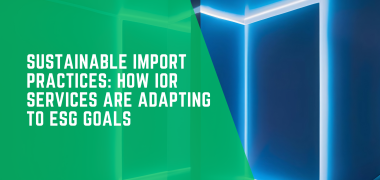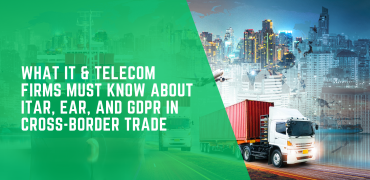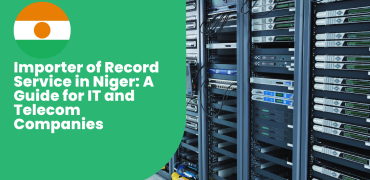In today’s global economy, businesses face increasing pressure to meet Environmental, Social, and Governance (ESG) goals while navigating complex international trade landscapes. Companies operating across borders must adopt sustainable practices that align with their commitments to environmental stewardship, social responsibility, and ethical governance. A critical yet often overlooked aspect of this transition is the role of Importer of Record (IOR) services in enabling sustainable import practices.
This article explores how IOR services are adapting to ESG goals, providing businesses with solutions to balance profitability and sustainability in global trade.
The Intersection of IOR Services and ESG Goals
Importer of Record (IOR) services play a vital role in ensuring compliance with local import laws, managing customs documentation, and navigating taxation. Traditionally, these services focused on operational efficiency and cost management. However, with the rise of ESG priorities, IOR providers are shifting to align their practices with global sustainability standards.
By integrating ESG principles into their operations, IOR providers can:
- Minimize the environmental footprint of import activities.
- Ensure ethical supply chain practices.
- Enhance transparency and compliance with global regulations.
- Support businesses in achieving their ESG commitments.
Environmental Impact: Greening the Supply Chain
One of the key areas where IOR services contribute to ESG goals is reducing the environmental impact of global trade.
1. Carbon Footprint Reduction
IOR providers are adopting innovative strategies to minimize carbon emissions associated with importing goods. These include:
- Optimized logistics routes: Leveraging technology to choose energy-efficient shipping routes.
- Collaborating with green carriers: Partnering with freight companies that prioritize sustainable fuel and eco-friendly operations.
2. Sustainable Packaging Initiatives
IOR providers can recommend or require sustainable packaging materials for goods being imported. By working with suppliers to use biodegradable or recyclable packaging, they help reduce landfill waste.
3. Compliance with Environmental Standards
IOR services ensure that imported goods meet local environmental regulations, such as RoHS (Restriction of Hazardous Substances) or WEEE (Waste Electrical and Electronic Equipment) directives in the EU. This reduces the environmental impact of products and their disposal.
Social Responsibility: Supporting Ethical Practices
Social sustainability is a cornerstone of ESG frameworks, and IOR services are stepping up to ensure ethical practices across the supply chain.
1. Fair Labor and Human Rights
IOR providers play a role in vetting suppliers and ensuring that imported goods are sourced ethically. This includes:
- Verifying compliance with fair labor practices.
- Avoiding suppliers involved in child labor, forced labor, or unsafe working conditions.
2. Local Community Impact
By supporting local customs brokers and logistics providers, IOR services can contribute to community development and job creation in importing countries.
3. Diversity and Inclusion
Some IOR providers are actively promoting diversity within their operations and supply chains, ensuring equitable opportunities for minority-owned businesses and underrepresented groups.
Governance: Enhancing Transparency and Accountability
Strong governance practices are crucial to achieving ESG goals, and IOR services play a significant role in fostering accountability and compliance in global trade.
1. Regulatory Compliance
IOR providers ensure that businesses comply with international trade laws, reducing the risk of penalties and reputational damage. This includes:
- Managing import taxes and duties transparently.
- Ensuring goods comply with local certifications and standards.
2. Supply Chain Transparency
By providing detailed documentation and audit trails, IOR services enhance visibility into the supply chain. This transparency is essential for:
- Verifying the ethical sourcing of materials.
- Tracking the environmental impact of imported goods.
3. Technology-Driven Governance
IOR providers are leveraging technologies such as blockchain and AI to improve governance. Blockchain, for example, ensures an immutable record of transactions, enhancing trust and accountability in the supply chain.
Challenges in Adopting Sustainable Practices
While IOR services are making strides in aligning with ESG goals, several challenges remain:
1. Cost Implications
Sustainable practices often require upfront investments in technology, training, and infrastructure, which can increase operational costs.
2. Complex Regulatory Landscapes
Navigating the varying ESG regulations across countries is a significant challenge for IOR providers, as compliance requirements are not always standardized.
3. Lack of Awareness
Many businesses remain unaware of the role IOR services can play in achieving their ESG goals, leading to missed opportunities for collaboration.
Strategies for IOR Services to Drive ESG Goals
To overcome these challenges and fully integrate ESG principles, IOR providers can adopt the following strategies:
1. Collaborate with Stakeholders
Building partnerships with manufacturers, logistics providers, and regulatory bodies ensures a unified approach to sustainability.
2. Invest in Green Technologies
Adopting technologies such as carbon tracking tools, eco-friendly logistics software, and AI-driven compliance platforms can help IOR services operate more sustainably.
3. Educate and Advocate
IOR providers should actively educate their clients on sustainable import practices and advocate for ESG adoption across the supply chain.
4. Develop ESG-Focused Service Offerings
Creating specialized services, such as ESG audits or green certification support, can help businesses align their import activities with sustainability goals.
Case Study: A Tech Company’s Sustainable Import Strategy
Consider a global tech company expanding its operations into Asia. The company faced challenges in meeting ESG goals due to the high environmental impact of importing servers and electronic components.
By partnering with an ESG-aligned IOR provider, the company achieved the following:
- Reduced Carbon Emissions: The IOR optimized shipping routes and partnered with green logistics providers.
- Ethical Sourcing: The provider ensured compliance with fair labor standards by vetting suppliers.
- Enhanced Transparency: The IOR implemented blockchain-based documentation, providing full visibility into the supply chain.
This collaboration enabled the tech company to expand sustainably while reinforcing its ESG commitments.
Conclusion: The Future of IOR Services in ESG
As businesses face mounting pressure to meet ESG goals, IOR services are evolving to become key enablers of sustainable global trade. By integrating environmental, social, and governance principles into their operations, IOR providers can:
- Help businesses reduce their carbon footprint.
- Ensure ethical and responsible sourcing.
- Enhance transparency and compliance across the supply chain.
For companies committed to sustainability, partnering with an ESG-focused IOR provider is not just a strategic advantage but a necessity in today’s global marketplace. Together, they can pave the way for a more sustainable and equitable future in international trade.




